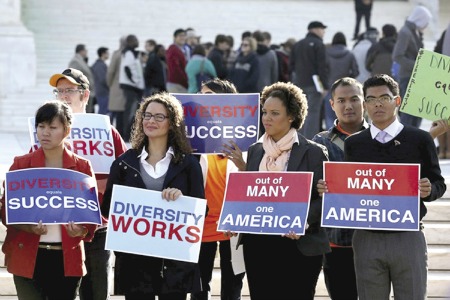
Last week, a national conference titled “Public Education and the future of Affirmative Action,” was organized by Wayne County Community College District Chancellor Dr. Curtis Ivery the future of affirmative action policies in education in the context of pending case before the U.S. Supreme Court.
As the only non-academic on the panel of researchers and academicians from leading universities across the country, it was interesting to hear speaker after speaker discuss studies and research that have shown that diversity is not only a compelling interest, but necessary for the well-being of the nation.
The WCCCD program is the first response in the region to bring attention to the affirmative action case currently before the United States Supreme Court, emanating from the University of Texas, highlighted the significance of access to higher education for minorities.
Why? Because access to higher learning for minorities creates a more robust and diverse workforce, especially in the era of a growing multicultural America.
If the high court strikes down affirmative action it will be more difficult for African Americans and other people of color seeking admission to some of the nation’s top universities.
It would send a wrong message at a time when diversity is on the lips of every business and government leader. That is because the global economy cannot survive without a diverse workforce.
One person who has made diversity a mission at one of the state’s educational institutions is Ron Snead, chair of the Board of Trustees at Ferris State University (FSU). Snead is the first African American to graduate from Ferris and the second to chair its board.
“Diversity is beneficial to both people of color and the workforce because we live in a global marketplace,” Snead said in an interview. “We have to understand that the demographics have changed so dramatically in this country where minorities will be the majority.”
Snead, who is completing his first eight-year term as a member of the Board of Trustees and looking to serving another term, said diversity is increasingly becoming a top priority for Ferris State University.
Gov. Rick Snyder is expected to make announcements on reappointments and replacements of university boards such as that of Ferris.
At Ferris, Snead said prioritizing a diverse faculty and staff, improving student retention and graduation rates and maintaining financial discipline are among his goals of seeing the institution continue to do better.
Snead, who has had long history of addressing issues around access in education, equity and justice that includes serving as president of the Ferris State College NAACP chapter during his early years, told the Ferris State Torch that he got involved to make the school a better place.
Through Snead’s work, the university today has what is perhaps the only Jim Crow Museum of Racist Memorabilia in the country, a powerful exhibit that uses objects of intolerance to teach tolerance, social justice and respect for all. The exhibit, which has attracted visitors from across the world is led by Dr. David Pilgrim, founder and curator of the museum who serves as vice president of diversity and inclusion at the university.
Aletha Muhammad, a former student, praised Snead for his role in creating a diverse campus at FSU, recalling that as a student in 2000 she realized that there were not more than six African American professors at the university.
“I am thankful that you had the courage and dignity to open doors for generations of all students from all backgrounds to attend FSU. Just know that your purpose still lives on,” Muhammad said of Snead.
As the U.S. Supreme Court deals with affirmative action, what would a negative ruling mean for educational institutions like Ferris State?
“It would have a negative effect not only on educational institutions like Ferris State but also on corporations,” Snead said. “This would be a detriment to the country. How can you ask for more diverse applicants if they don’t have an opportunity to graduate? So at the end of the day, what you are creating is second class citizens where only those who can afford a four-year college can make it.”
Snead said the nation will be heavily impacted economically if affirmative action is banned by the court.
“Who is the workforce going to be? The days of manual labor are over. You have to have some kind of skill either vocational or an educational degree to make it,” Snead said.
Women will be affected by a negative ruling on affirmative action, Snead noted.
“This goes back to the glass ceiling,” he said.
Diversity, he stressed, helps everyone succeed.
